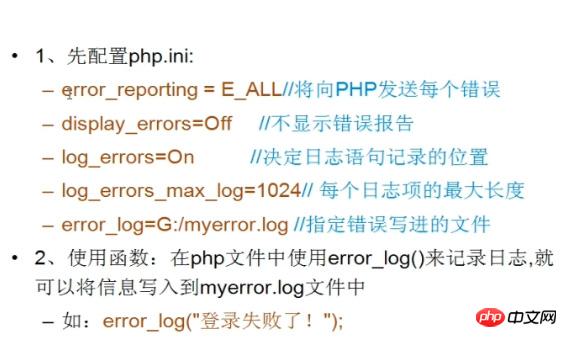
Any programmer may have encountered some mistakes during development, or errors caused by other reasons. Of course, if the user is unwilling or does not follow the constraints of the application, it will also cause some errors when using it. The following article mainly introduces you to common errors and exception handling in PHP. Friends who need it can refer to it,
Preface
When we develop a program, it is very common for the program to have problems. How should we deal with exceptions and errors? This article will introduce you to the relevant content of PHP errors and exception handling in detail, and share it for your reference and study. I won’t say much below, let’s take a look at the detailed introduction:
一, PHP error handling
1. Syntax error
2. Runtime error
3. Logic error: no prompt Error, but the function is wrong, the most troublesome
4. Three levels: notice/warning/fatal error (cannot continue execution)
5. Error report shows:
a. You can modify the error_reporting item in php.ini to limit the error report type, such as:error_reporting=E_ALL & ~E_NOTICE
b. Modify only To display errors within a script, you can useerror_reporting(E_ALL & ~E_NOTICE);(recommended)
6. Custom error report:set_error_handler()You can pass in the predetermined parameters for displaying errors, as follows:
set_error_handler('reportError'); $mess=""; function reportError($error_type,$error_message,$error_file,$error_line){ global $mess; $mess.="发生错误级别为{$error_type}类型,错位信息{$error_message},在文件{$error_file}中,第{$error_line}行。
"; } getType($a); echo "1111111
"; getType(); echo "2222
"; echo $mess; /*发生错误级别为8类型,错位信息Undefined variable: a,在文件F:\projects\Frame\FrameTest\BackEnd\regularExpression.php中,第24行。 发生错误级别为2类型,错位信息gettype() expects exactly 1 parameter, 0 given,在文件F:\projects\Frame\FrameTest\BackEnd\regularExpression.php中,第26行。*/
7. Record error log
a. Change display_errors in PHP.ini Set to Off, log_errors is set to On
b. Custom log directoryerror_log="C:/XX/XX/php_error.log"

c. You can also useini_set("display_errors", "Off")or ini_get to set it inside the script
2. PHP exception handling
1.try catch is integrated, there cannot be any code in the middle
2.Exception is predefined by the system Class
3. If an exception object is thrown, give the exception object to the class in catch
4. The code after the exception position in try is no longer Continue execution, but go directly to the catch execution
try{ echo "开车上班
"; throw new Exception("车子爆胎了!"); }catch(Exception $e){//相当于Exception $e = new Exception(''); echo $e->getMessage().'
'; echo '换上备胎,继续上班
'; }
5. Exception handling can be used in conjunction with error handling
set_error_handler('reportError'); function reportError($error_type,$error_message,$error_file,$error_line){ if($error_type==E_WARNING){ throw new Exception("错误信息:{$error_message},错误文件:{$error_file},错误行数{$error_line}"); } } function drive($a){ echo $a; } try{ echo "开车上班
"; drive();//忘记传参,触发自定义错误函数中警告性错误,抛出异常 }catch(Exception $e){//相当于Exception $e = new Exception(''); echo $e->getMessage().'
'; echo "换上备胎,继续上班
"; }
6. Custom exception class
a. The Exception class is the base class for all exceptions and does not define specific exception handling methods (only some methods for obtaining prompts)
b. The custom exception class must be a subclass of the system class
c. If you continue the Exception class and rewrite the constructor, don’t forget to call the parent class constructor for initialization
class BTException extends Exception { function __construct($message){ parent::__construct($message); } function method(){ return "打开后备箱,拿出工具,换备胎"; } } try{ echo "开车上班
"; throw new BTException("车子爆胎了!"); }catch(BTException $e){//相当于Exception $e = new Exception(''); echo $e->getMessage().'
'; echo $e->method().'
'; echo "换上备胎,继续上班
"; }
7. Capture multiple exceptions. Note: try can also be nested in try
class Err1 extends Exception { function __construct($message){ parent::__construct($message); } function method(){ return "纠正错误1"; } } class Err2 extends Exception { function __construct($message){ parent::__construct($message); } function method(){ return "纠正错误2"; } } class Err3 extends Exception { function __construct($message){ parent::__construct($message); } function method(){ return "纠正错误3"; } } $rand=rand(1,3); try{ switch($rand){ case 1: throw new Err1("发生错误1"); case 2: throw new Err2("发生错误2"); case 3: throw new Err3("发生错误3"); } }catch(Err1 $e){ echo $e->getMessage().'
'; echo $e->method().'
'; }catch(Err2 $e){ echo $e->getMessage().'
'; echo $e->method().'
'; }catch(Err3 $e){ echo $e->getMessage().'
'; echo $e->method().'
'; }
Summarize
The above is the detailed content of Detailed explanation of error and exception handling in php. For more information, please follow other related articles on the PHP Chinese website!




